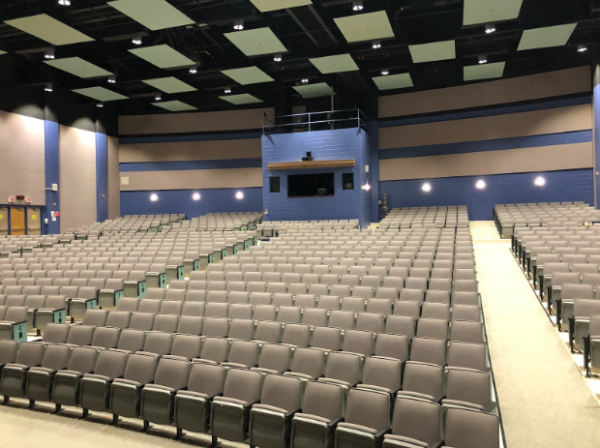School Starting at Later Times: Pros and Cons to an Ongoing Dilemma

April 18, 2023
School, an already controversial topic when brought up in arguments and news as it relates to students and staff, has just got a little bit more controversial. In the U.S., different states and government bodies regulate what time school starts for different grade levels depending on a multitude of factors. These times vary greatly, beginning with extremely early times such as 7:30 a.m. in Mississippi for age groups as young as as young age groups as elementary schoolers. Now alongside these school starting times, many different opinions are formed revolving around the fact of is it really necessary for such early times, what are some of the pros and cons to these times, and how were these times implemented in the first place.
In Frederick County, Maryland, elementary schools can start as early as 8 a.m. all the way to 9 and 9:30 a.m. respectively. In Middle and High Schools in Frederick County, times also vary, but a common ground for bells ringing in the morning for a typical Middle Schooler would be around 8-8:30 a.m. and for High Schoolers 7:00-7:30 a.m. As you can see, Elementary School students and staff have the opportunity to get more rest for the next day compared to Middle and High Schoolers, but why? Some of the answers dwell in the fact that adolescents need more sleep than older kids, while other answers relate to bus routes and transportation systems. While one answer can not be provided for students such as myself, the benefits and downsides to school times can be analyzed, starting with some of the pros to later starting times compared to earlier ones.
To address the elephant in the room regarding a later morning bell, students would obviously get more rest leading to an increase in a multitude of skills and traits. In a popular study done by AAPT, they chose to challenge the question “to rest or to sleep,” leading to effects on sleep deprivation and the impact it has on students’ grades. Students in college who slept for less than 5 hours averaged 81%-82% on their exams while students who slept for five hours or more averaged 83%-85%. After the students that participated in the experiment saw the “evidence that staying up all night studying for a final exam would likely hurt their score on the exam, class average hours of reported sleep significantly increased”(AAPT). With this significant difference in exam scores and the association of sleep’s effect on the scores, students and staff now know really how important sleep is from an educational standpoint. Less tardiness is another point commonly brought up when discussing this topic, which would help students absorb more information in their earlier classes in the day and overall increase grade point averages (gpa). A final point that can be made for the positives for starting school later would be for the staff and more specifically the teachers of the schools, regarding what will be planned for in the day and the future. Complication and difficulties understanding material in a course will most likely be decreased leading to a more organized and put together class. With all of this being said on the other hand, there still are negatives for later starting times and some of them might open some eyes.
The schedules of families that are so meticulously planned out in preparation for a 7:00-7:30 a.m. bell ring would instantly be disrupted, as even an extra hour of sleep would lead to an extra hour of getting out of school later. Many students such as High Schoolers depend on transportation in the forms of cars, after school activities like sports, and bus routes. A student who depends on an earlier start time for school, Chase King, student at Urbana High, said, “If school were to start later, say 8:30 a.m, my parents wouldn’t be able to drop me off in the mornings.” This could be a common reflection in many students’ schedules all across school districts. All of these systems of transportation would have to shift while fitting the mold of schedules for the people running and directing these arrangements. In Frederick County, Maryland, a study was presented in front of the school board, displaying the estimation of costs regarding new bus routes, services, and vehicles. A shocking 1.2 million dollar figure was bolded while on top of that the study also concluded that; “the change would result in increased costs in the forms of bus driver salaries, additional fuel use and more bus parts”(FNP). This large sum of money has been enough to keep school board members and lawmakers away from this idea, and is one of the primary reasons why a change has not already been placed in motion. Responsibilities and choices belonging to students that would be affected by a later school start time would be even more dire and important, as some might decide to stay up later and the end result being no change in sleep from what an earlier start of school used to be from what a later one would be. A point that is often not included in this discussion regarding negatives to a later school starting would be the ability to do homework. Homework and the procedure some students complete it in would be affected immediately with regards to their current schedules out of school. For example, if a student was to push off homework on a typical 7:30 a.m starting school schedule, the student would be able to get their homework done right after school. A sport like baseball and its practice could begin around 4:30 p.m., and with an earlier release for this student, they would indeed have time in between to finish this homework without being utterly exhausted. However, comparing this to a later school start time and the same schedule, the identical homework that might be lengthier and take more time some nights would have a lower chance to be completed with concern to baseball practice and the schedule of the student. Something to seriously consider for students in all grade levels that are involved in extracurricular activities would be a simple example like this, while only being exacerbated by an even more complicated or busier schedule.
Now while comparing the simple pros and cons to a later school schedule might be challenging to do, the straightforward path to answer this age old question would be: it seriously just depends. Now I know this is an anti-climactic way to end an article relating to such a controversial and impactful topic to the lives of many, schedules and systems that are already in motion all either permit or prevent such plans to come to fruition. A later start time to school for students struggling with sleep might look nice on paper, but underlying issues regarding students schedules’ would ultimately have to be resolved or else the end result would be the exact same thing. Parents and students as time goes on are seemingly beginning to agree on later start times and some policies to be placed into motion, but this all still lands in the ballpark of lawmakers and local legislatures. The schools doors opening at early times are in place for a reason, and the sheer amount of changes that would have to be made in order to fit in a later school schedule seems unlikely. The enjoyability of getting out of school earlier rather than later is immeasurable and convenient. If you want a change in your school start time, you can attend local school board meetings and offer input there or simply vote on polls relating to the topic. Adjustments and shifts in school schedules can be made in the future, but it will require a tremendous amount of support and voices from the public.
Gaille, L. (2019, December 16). 19 should school start later in the Morning pros and cons. Vittana.org. Retrieved March 30, 2023, from https://vittana.org/19-should-school-start-later-in-the-morning-pros-and-cons
Coletta, V. P. (1970, January 1). To study or to sleep: How seeing the effect of sleep deprivation changed students’ choices. American Association of Physics Teachers. Retrieved March 30, 2023, from https://aapt.scitation.org/doi/10.1119/1.5145469#:~:text=Increasing%20one’s%20hours%20of%20sleep,a%20B%20to%20an%20A%2D.







































